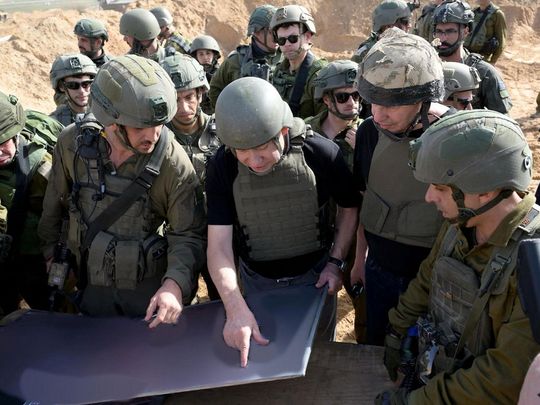
After the announcement of the Gaza truce, two contrasting opinions have surfaced based on each party’s emotions and convictions.
The first viewpoint asserts that Hamas emerged victorious, compelling the Israelis to accept its conditions, while the second perspective argues that Israel triumphed, coercing Hamas to release its prisoners.
The war in Gaza has brought the Palestinian cause to the forefront. No doubt the Palestinians confront a fierce foe, and the actions carried out by the IDF rival even the atrocities committed during the traditional colonial rule, be it by the French, British, or Italian colonial powers.
The situation in Israel amounts to outright oppression where Palestinians live in a complete slavery, and the world often witnesses it in various forms. This reality has been acknowledged by certain individuals of conscience within Israel.
In a televised interview, a former Israeli soldier revealed that Israeli security services have assigned identification numbers to every household across all regions of the West Bank. This enables them to track the number of residents in each home and their occupations.
The recently freed Palestinian women and girls, who were neither charged with specific offences nor sentenced, have spoken out about their mistreatment, detailing their experience of being confined in solitary rooms. They recounted instances of assault. These harrowing stories underline the depths of the suffering endured by Palestinians under what can only be described as oppression.
It is worth noting that if war resumes following the truce, there are concerns that Israel’s response could intensify. Some information gleaned from previously released prisoners suggests that, as a result, there might be a swift and forceful operation carried out by Israeli forces to free the remaining detainees.
Zionism and power
This action could serve a dual purpose by not only securing the release of detainees but also restoring confidence in the Israeli army within the domestic sphere.
Conversely, certain factions should not rely solely on rallies, protests, or the backing from influential voices emerging from major Western powers.
Despite the popularity of these voices, including Jewish advocates from middle-class backgrounds, Zionism continues to wield significant influence within Western elites. The Israeli elite consistently counts on unwavering and uninterrupted support, sometimes even surpassing that of local politicians.
The Western media focuses exclusively on the events of Oct. 7, while there is a significant reluctance to shed light on the realities of the open-air prison and associated conditions in Gaza. Similarly, there is a lack of attention given to the daily humiliations endured by Palestinians residents in West Bank cities and camps.
Little mention is made of the staggering number of Palestinian detainees crammed into overcrowded Israeli prisons, nor the ongoing arrogance they confront on a daily, hourly basis.

Surveillance society
In fact, Israelis have turned their historical experience of living in European “ghettos” into a parallel situation for Palestinians living in camps, which ought to be termed “ghettos”.
These conditions are arguably harsher than those endured by Jews in Europe, given that Palestinian homes are not only numbered but also subjected to constant surveillance, a reality that did not exist during the period when Jews were living in European ghettos.
These portrayals depict the stark realities faced by Palestinians in Gaza and the occupied West Bank — issues that cannot be resolved merely by hopes or prayers, as some may advocate. Such issues require responsible and serious action, foremost and foremost of which is the unity of the Palestinians themselves.
The divisions, isolation, and marginalisation within Palestinian society have created openings for Israeli targeting of Palestinian groups, often accompanied by the argument that Palestinians lack a cohesive and defined goal.
Global sympathy for Palestine
The current global sympathy for the Palestinian cause, though significant, may only offer temporary support and could prove ineffective in the medium term.
Relying solely on this sympathy, without a unified political programme endorsed by all Palestinian parties and actively advocated for on a global scale, risks squandering opportunities and potentially jeopardising the cause.
This risk becomes more pronounced, especially if Israel persists in its war on Gaza in the coming days. Such a scenario could result in Gaza and its people being isolated, potentially leading to a situation where the world passively accepts it.
Hence, the situation demands frankness, reconciliation, distribution rules, harmony and advocacy.
Without doing so, the sacrifices made by those whose lives were shattered or those whose bones were crushed under the buildings in Gaza — including children, women, and the elderly — may end up being in vain, overshadowed by the actions of politicians and those who use their loud voices solely for political posturing.
Mohammad Alrumaihi is a thinker, author and Professor of Political Sociology at Kuwait University









